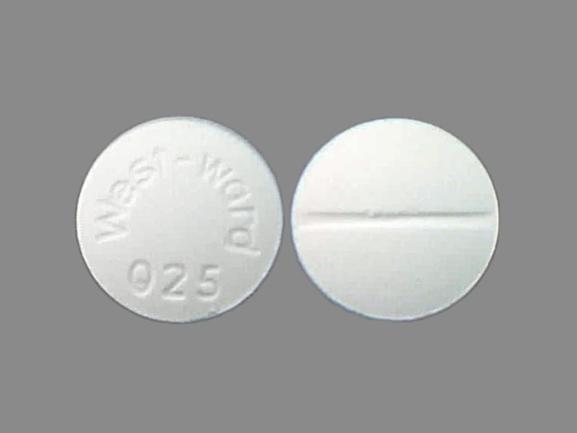Aminophylline (injection)
Generic name: aminophylline (injection) [ a-min-OFF-i-lin ]
Brand names: Phyllocontin, Truphylline
Dosage form: intravenous solution (25 mg/mL)
Drug class: Methylxanthines
What is aminophylline?
Aminophylline is a bronchodilator that is used with other medications to treat sudden worsening of the symptoms of asthma, bronchitis, or emphysema.
Aminophylline may also be used for purposes not listed in this medication guide.
Aminophylline side effects
Get emergency medical help if you have signs of an allergic reaction: hives; difficult breathing; swelling of your face, lips, tongue, or throat.
Tell your caregivers right away if you have:
-
vomiting or severe nausea;
-
fast or irregular heartbeats;
-
a seizure;
-
high blood sugar--increased thirst, increased urination, dry mouth, fruity breath odor; or
-
low potassium level--leg cramps, constipation, irregular heartbeats, fluttering in your chest, numbness or tingling, muscle weakness or limp feeling.
Serious side effects may be more likely in older adults.
Common side effects of aminophylline may include:
-
nausea, vomiting, diarrhea;
-
feeling restless or irritable;
-
tremors;
-
increased urination;
-
headache; or
-
sleep problems (insomnia).
This is not a complete list of side effects and others may occur. Call your doctor for medical advice about side effects. You may report side effects to FDA at 1-800-FDA-1088.
Related/similar drugs
Warnings
In an emergency, you may not be able to tell caregivers about your health conditions. Make sure any doctor caring for you afterward knows you received aminophylline.
Before taking this medicine
You should not be treated with this medicine if you are allergic to aminophylline or theophylline.
If possible before you receive aminophylline, tell your caregivers if you have recently had a fever, or if you have ever had:
-
heart problems;
-
fluid in your lungs;
-
a thyroid disorder;
-
cirrhosis, hepatitis, or other liver problems;
-
kidney disease; or
-
a serious infection called sepsis.
Tell your doctor if you smoke or have recently stopped smoking. Smoking can affect your aminophylline dose needs.
It is not known whether this medicine will harm an unborn baby. Tell your doctor if you are pregnant.
Aminophylline can pass into breast milk and may cause fussiness or other side effects in the nursing baby. Tell your doctor if you are breast-feeding.
In an emergency, you may not be able to tell caregivers about your health conditions. Make sure any doctor caring for you afterward knows you received this medicine.
How is aminophylline given?
Aminophylline is given as an infusion into a vein. A healthcare provider will give you this injection.
You will need medical tests to help your doctor determine how long to treat you with aminophylline.
What happens if I miss a dose?
Because you will receive aminophylline in a clinical setting, you are not likely to miss a dose.
What happens if I overdose?
Since aminophylline is given by a healthcare professional in a medical setting, an overdose is unlikely to occur.
What should I avoid while receiving aminophylline?
Follow your doctor's instructions about any restrictions on food, beverages, or activity.
What other drugs will affect aminophylline?
Sometimes it is not safe to use certain medications at the same time. Some drugs can affect your blood levels of other drugs you take, which may increase side effects or make the medications less effective.
Tell your doctor about all your current medicines. Many drugs can affect aminophylline, especially:
-
interferon alfa;
-
lithium;
-
tacrine;
-
an antibiotic, or medication to treat tuberculosis;
-
birth control pills or hormone replacement therapy;
-
heart or blood pressure medication;
-
medication to treat gout or kidney stones;
-
medicine to treat infections caused by worms such as whipworm, pinworm, roundworm, and hookworm;
-
a sedative such as Valium; or
-
seizure medicine.
This list is not complete and many other drugs may affect aminophylline. This includes prescription and over-the-counter medicines, vitamins, and herbal products. Not all possible drug interactions are listed here.
More about aminophylline
- Check interactions
- Compare alternatives
- Pricing & coupons
- Reviews (1)
- Drug images
- Side effects
- Dosage information
- During pregnancy
- Drug class: methylxanthines
- Breastfeeding
- En español
Patient resources
Other brands
Professional resources
- Aminophylline Injection prescribing information
- Aminophylline Oral Solution (FDA)
- Aminophylline Tablets (FDA)
Related treatment guides
Further information
- Your pharmacist has additional information about aminophylline written for health professionals that you may read.
Remember, keep this and all other medicines out of the reach of children, never share your medicines with others, and use this medication only for the indication prescribed.
Always consult your healthcare provider to ensure the information displayed on this page applies to your personal circumstances.
Copyright 1996-2025 Cerner Multum, Inc. Version: 4.02.

